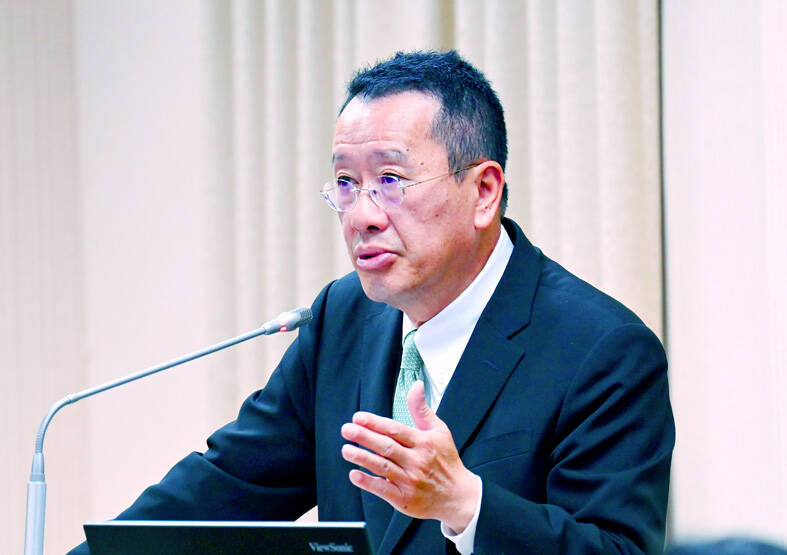Sixty-two military personnel held Chinese residence permits, including two volunteer service members, Minister of National Defense Wellington Koo (顧立雄) said at the legislature in Taipei yesterday, citing a probe that ended last month.
None of the personnel had Chinese passports, ID cards or permanent residency status, Koo told a meeting of the Foreign Affairs and National Defense Committee.
The personnel have been barred from combat operation centers, as well as units that handle sensitive information such as intelligence collection, information and communications, and research and development, he said.

Photo: Liu Hsin-de, Taipei Times
They also cannot be aides to commanding officers, he added.
Those with Chinese residency are also prevented from serving in aviation or naval units, and cannot operate new weapons systems, Koo said.
Media in February reported that a sailor surnamed Yang (楊) had obtained a Chinese ID card without his knowledge after his mother, a Chinese national who gained Taiwanese residency after marriage, applied on his behalf.
Yang said he wanted to renounce his Chinese citizenship.
The Ministry of National Defense in the past few days said that it had helped Yang declare his intent to the National Immigration Agency to retain his Taiwanese nationality.
Yang has been reassigned to a position that does not involve sensitive or classified information, the defense ministry said.
The screening process would be tightened to require volunteer service members to declare upon application that they hold no dual nationality or residency, it said.
The committee yesterday reviewed draft amendments to the Act of Military Service for Officers and Non-commissioned Officers of the Armed Forces (陸海空軍軍官士官服役條例) that would strip the military pensions of service members convicted of and imprisoned for rebellion, treason or contraventions of the National Security Act (國安法) during active service or after retirement.
Koo said that on Jan. 1, he approved 54 additional positions for the counterintelligence unit and personnel are being recruited to fill them.
Koo was also asked about shipbuilding.
Asked whether Taiwan would boost cooperation with the US in shipbuilding and ship-repair operations, Koo said that Taiwan “intends to do so,” without elaborating.

DAREDEVIL: Honnold said it had always been a dream of his to climb Taipei 101, while a Netflix producer said the skyscraper was ‘a real icon of this country’ US climber Alex Honnold yesterday took on Taiwan’s tallest building, becoming the first person to scale Taipei 101 without a rope, harness or safety net. Hundreds of spectators gathered at the base of the 101-story skyscraper to watch Honnold, 40, embark on his daredevil feat, which was also broadcast live on Netflix. Dressed in a red T-shirt and yellow custom-made climbing shoes, Honnold swiftly moved up the southeast face of the glass and steel building. At one point, he stepped onto a platform midway up to wave down at fans and onlookers who were taking photos. People watching from inside

A Vietnamese migrant worker yesterday won NT$12 million (US$379,627) on a Lunar New Year scratch card in Kaohsiung as part of Taiwan Lottery Co’s (台灣彩券) “NT$12 Million Grand Fortune” (1200萬大吉利) game. The man was the first top-prize winner of the new game launched on Jan. 6 to mark the Lunar New Year. Three Vietnamese migrant workers visited a Taiwan Lottery shop on Xinyue Street in Kaohsiung’s Gangshan District (崗山), a store representative said. The player bought multiple tickets and, after winning nothing, held the final lottery ticket in one hand and rubbed the store’s statue of the Maitreya Buddha’s belly with the other,

‘NATO-PLUS’: ‘Our strategic partners in the Indo-Pacific are facing increasing aggression by the Chinese Communist Party,’ US Representative Rob Wittman said The US House of Representatives on Monday released its version of the Consolidated Appropriations Act, which includes US$1.15 billion to support security cooperation with Taiwan. The omnibus act, covering US$1.2 trillion of spending, allocates US$1 billion for the Taiwan Security Cooperation Initiative, as well as US$150 million for the replacement of defense articles and reimbursement of defense services provided to Taiwan. The fund allocations were based on the US National Defense Authorization Act for fiscal 2026 that was passed by the US Congress last month and authorized up to US$1 billion to the US Defense Security Cooperation Agency in support of the

HIGH-TECH DEAL: Chipmakers that expand in the US would be able to import up to 2.5 times their new capacity with no extra tariffs during an approved construction period Taiwan aims to build a “democratic” high-tech supply chain with the US and form a strategic artificial intelligence (AI) partnership under the new tariffs deal it sealed with Washington last week, Taipei’s top negotiator in the talks said yesterday. US President Donald Trump has pushed Taiwan, a major producer of semiconductors which runs a large trade surplus with the US, to invest more in the US, specifically in chips that power AI. Under the terms of the long-negotiated deal, chipmakers such as Taiwan Semiconductor Manufacturing Co (TSMC, 台積電) that expand US production would incur a lower tariff on semiconductors or related manufacturing